27 start with J start with J
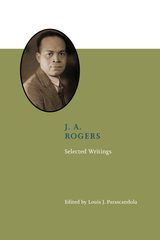
“No man living has revealed so many important facts about the Negro race as has Rogers,” wrote W. E. B. DuBois. Indeed, as Henry Louis Gates Jr. contends, J. A. Rogers was often the only source for an ordinary Black person to learn of their history from the 1920s through the 1970s. Now Louis J. Parascandola makes available an accessible collection of Rogers’s writings for a new generation.
Joel Augustus Rogers was born in Negril, Jamaica, in the late nineteenth century, where—although his father was a teacher—he received only basic education. Rogers emigrated to the United States and studied at the Art Institute of Chicago while working as a Pullman porter. He later took up journalism and moved to New York for better opportunities, writing for papers and journals published by the likes of Marcus Garvey, W. E. B. DuBois, and H. L. Mencken. While working with the Pittsburgh Courier, he was assigned to cover the Italo-Ethiopian War (1935–1937), becoming the first American Black foreign war correspondent. His column for the Courier became vital to the Black middle class, conveying stories of Black achievements and relating a distinguished history that imparted knowledge and pride. He continued this work with his books 100 Amazing Facts about the Negro with Complete Proof, the two-volume The World’s Great People of Color 3000 B.C. to 1946 A.D., and the novel From Superman to Man.
This engaging collection represents the wide range of Rogers’s work across time and demonstrates his intellectual philosophy. J. A. Rogers: Selected Writings is required reading for anyone interested in Black nationalism, Black journalism, Black literature, and Pan-African culture and identity.
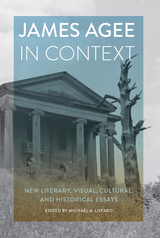
It’s difficult to overestimate the impact of the many new works by James Agee uncovered and published in the last twenty years. These previously unknown primary works have, in turn, encouraged a parallel explosion of critical evaluation and reevaluation by scholars, to which James Agee in Context is the latest contribution.
This superb collection from well-known James Agee scholars features myriad approaches and contexts for understanding the author’s fiction, poetry, journalism, and screenwriting. The essays bring the reader from the streets of James Agee’s New York to travel with the author from Alabama to Hollywood to Havana. Contributors explore overlapping and sometimes unique subjects, themes, and accomplishments (or lack thereof) in Agee’s uncovered works and highlight the diversity of interest that Agee’s complete body of work inspires. The insightful scholarship on influence examines connections between Agee and Wright Morris, Helen Levitt, John Dos Passos, Ernest Hemingway, and Stephen Crane. Such juxtapositions serve to illustrate how Agee drew on literary influences as a young man, how he used his work as a journalist to craft fiction as he was about to turn thirty, and his influence upon others. The volume concludes with three poems and a short story by Agee, all previously unknown.
It seems astonishing that so much remains to be discovered about this protean author, his materials, and his circle. Yet, the recovery and analysis of neglected texts and information mined from newspapers and magazines proves the extent to which Agee kept his mind and his work, as he himself put it, “patiently concentrated upon the essential quietudes of the human soul.”
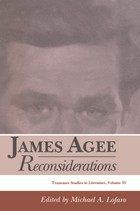
Continually exploring new fields, Agee achieved success as a poet, journalist, and essayist, as well as a writer of screenplays and fiction. Agee's sense of place, ingrained in him during his boyhood in Knoxville, Tennessee, provided the ground upon which he tested the temper of his creative process and his beliefs and attempted to reconcile the Romantic and Modern viewpoints into what he termed a "whole of consciousness."
But the price of attempting transcendence was high. At times Agee ravaged his own life in a quest to dissolve the barrier between reality and art; at other times, his gusto and vitality were converted into unique and innovative works like the audacious and uncategorizable Let Us Now Praise Famous Men and the highly charged autobiographical novel A Death in the Family. The essays in this volume, drawn in part from the 1989 "Agee Legacy" symposium, focus upon these two major works and upon Agee's explorations of narrative technique. The authors demonstrate that the measure of Agee's success is in large part the direct result of his supposed flaws: his variety of subject and form, and his life of often reckless abandon.
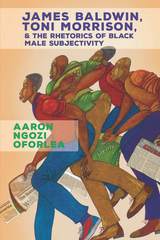
Oforlea’s book offers new analyses of the character dynamics in Baldwin’s Go Tell It on the Mountain, Tell Me How Long the Train’s Been Gone, and If Beale Street Could Talkand Morrison’s Beloved, Song of Solomon, and Tar Baby. The black male characters in these novels encounter the discursive divide, or a cultural dissonance, when they encounter dominant representations of black male identities. They use these opportunities to construct a counter-discourse about black male subjectivity. Ultimately, Oforlea argues, these characters are strategic about when and how they want to appropriate and subvert dominant ideologies. Their awareness that post-racial discourses perpetuate racial inequality serves as a gateway toward participation in collective struggles for racial justice.
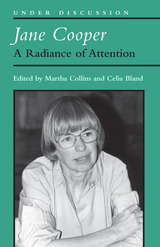
Martha Collins and Celia Bland bring together several decades’ worth of essential writing on Cooper’s poetry. While some pieces offer close examination of Cooper’s process or thoughtful consideration of the craft of a single poem, the volume also features reviews of her collections, including a previously unpublished piece on her first book, The Weather of Six Mornings (1969), by James Wright, a lifelong champion of her work. Marie Howe, Jan Heller Levi, and Thomas Lux, among others, share personal remembrances of Cooper as a teacher, colleague, and inspiration. L. R. Berger’s moving tribute to Cooper’s final days closes the volume. This book has much to offer for both readers who already love Cooper’s work and new readers, especially among younger poets, just discovering her enduring poems.
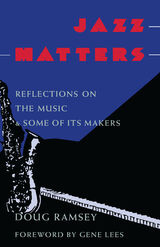
Rich in anecdote and insight, Jazz Matters is a collection of essays, profiles, and reviews by Doug Ramsey, and observer and chronicler of jazz and its musicians for more than thirty years. It stirs the reader to discover or rediscover the music and performers Ramsey describes. His accounts of recording sessions and live performances enhance this excellent review of the history, variety, and artistic depth that make jazz so profound an element in modern culture.
Jazz Matters gives the reader a basis for understanding jazz improvisation Ramsey’s sensitive, straightforward, and entertaining pieces promote appreciation of the accomplishment of artists from Louis Armstrong to John Coltrane and Ornette Coleman.
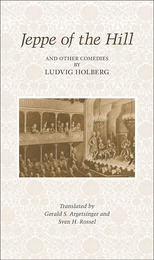
These eight comedies comprise the most extensive collection of Ludvig Holberg plays ever offered in the English language.
The translators’ general introductions establish a cultural context for the comedies and break new ground in understanding the importance of Holberg’s comic aesthetic. Argetsinger’s extensive experience in theatre and Rossel’s preeminence as a Scandinavian Studies scholar assure that the translations are not only accurate but stage-worthy.
The collection opens with The Political Tinker, the first Danish play to be produced in the new Danish Theatre, and ends with The Burial of Danish Comedy, literally the funeral service for the bankrupt theatre. Three more of Holberg’s renowned character comedies follow, Jean de France, Jeppe of the Hill, and Erasmus Montanus, along with his literary satire Ulysses von Ithacia. The final two plays demonstrate his ability to write shorter comic works, The Christmas Party, a scathing comedy of manners, and Pernille’s Brief Experience as a Lady, a situation comedy that satirizes the practice of baby-switching.
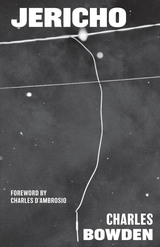
When Charles Bowden died in 2014, he left behind an archive of unpublished manuscripts. Jericho marks the fifth installment in his venerable “Unnatural History of America” sextet. In it he invokes the cycles of destruction and rebirth that have defined the ancient biblical city over millennia. From the ruins of Jericho’s walls Bowden reflects on the continuum of war and violence—the many conquests of the Americas; the US-Mexican War; the Vietnam War; and the ongoing militarization of our southern border—to argue against the false promise of security that is offered when men “build that wall.” Walls—both real and imagined—will always come tumbling down.
Along the way, Bowden tells stories of loss and violence, like that of David Hartley, who mysteriously vanishes on Falcon Lake; of murdered drug runners and their cartel bosses; and of a haunted sicario, or hitman, who is running from his past and compulsively confesses his sins as he searches for an absolution that will never come. Set against these scenes of trauma and violence are Bowden’s gorgeous meditations on nature: dancing cranes, soaring eagles, winding paths that traverse mountains, lakes, and deserts. And threaded throughout are the heroic narratives of men like Martin Luther King Jr., who defied the boundaries that surrounded him and was able to reshape the arc of history. Jericho is a remarkable affirmation of our shared humanity and a timely rejection of violence and nationalism by one of our most prophetic writers working at the height of his powers.
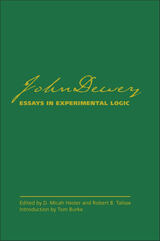
Offering a new edition of Dewey’s 1916 collection of essays
This critical edition of John Dewey’s 1916 collection of writings on logic, Essays in Experimental Logic—in which Dewey presents his concept of logic as the theory of inquiry and his unique and innovative development of the relationship of inquiry to experience—is the first scholarly reprint of the work in one volume since 1954. Essays in Experimental Logic, edited by D. Micah Hester and Robert B. Talisse, uses the authoritative texts from the Collected Works of John Dewey, 1882–1953 (published by Southern Illinois University Press) and includes as well articles from leading journals representing various contemporary schools of philosophy that criticized Dewey’s experimentalism.
Culling materials from six volumes of the chronologically arranged Collected Works, this single-volume edition of Essays marks a crucial point in Dewey’s intellectual development: one in which Dewey critically engages idealistic and intuitionist theorists and lays the groundwork for his mature theory of inquiry. The text includes a new introduction by renowned Dewey scholar Tom Burke that places Essays in philosophical and historical context. In addition to the original essays, Essays in Experimental Logic also features five critical essays by Dewey’s contemporaries, including Bertrand Russell, Wendell T. Bush, R. F. Alfred Hoernlé, H. T. Costello, and C. S. Peirce.
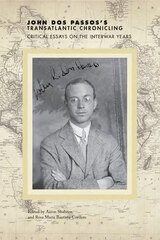
“I never could keep the world properly divided into gods and demons for very long,” wrote John Dos Passos, whose predilection toward nuance and tolerance brought him to see himself as a “chronicler”: a writer who might portray political situations and characters but would not deliberately lead the reader to a predetermined conclusion. Privileging the tangible over the ideological, Dos Passos’s writing between the two World Wars reveals the enormous human costs of modern warfare and ensuing political upheavals.
This wide-ranging and engaging collection of essays explores the work of Dos Passos during a time that challenged writers to find new ways to understand and render the unfolding of history. Taking their foci from a variety of disciplines, including fashion, theater, and travel writing, the contributors extend the scholarship on Dos Passos beyond his best-known U.S.A. trilogy. Including scholars from both sides of the Atlantic, the volume takes on such topics as how writers should position their labor in relation to that of blue-collar workers and how Dos Passos’s views of Europe changed from fascination to disillusionment. Examinations of the Modernist’s Adventures of a Young Man, Manhattan Transfer, and “The Republic of Honest Men” increase our understanding of the work of a complicated figure in American literature, set against a backdrop of rapidly evolving technology, growing religious skepticism, and political turmoil in the wake of World War I.
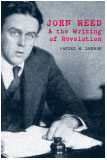
John Reed (1887-1920) is best known as the author of Ten Days That Shook the World and as champion of the communist movement in the United States. Still, Reed remains a writer almost systematically ignored by the literary critical establishment, even if alternately vilified and lionized by historians and by films like Warren Beatty’s Reds.
John Reed and the Writing of Revolution examines Reed’s writing from a different critical perspective—one informed by a theoretical and practical understanding of literary nonfiction. In both politics and writing, John Reed defied fashion. In his short career, Reed transcended the traditional creative arts of fiction, poetry, and drama in favor of deeply researched histories composed with the cadence of fiction and the power of fact. Reed thereby alienated literary critics who had idealized timeless artistry against the rough-and-tumble world of historical details and political implications.
Working from a close investigation of rare articles, manuscripts, and the Reed papers at Harvard as well as from Reed’s published work, Daniel W. Lehman offers the first detailed literary study of the man who followed Pancho Villa into battle; wrote literary profiles of such characters as Henry Ford, William Jennings Bryan, and Billy Sunday; explicated the Byzantine factionalism of Eastern Europe; and witnessed the storming of the Winter Palace and the birth of Soviet Russia.
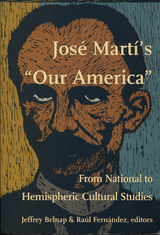
A Cuban exile from 1881 to 1895, Martí was a correspondent writing in New York for various Latin American newspapers. Grasping the significance of rising U.S. imperial power, he came to understand the Americas as a complex system of kindred—but not equal—national formations whose cultural and political integrity was threatened by the overbearing aggressiveness of the United States. This collection explores how in his journalistic work Martí critiques U.S. racism, imperialism, and capitalism; warns Latin America of impending U.S. geographical, cultural, and economic annexation; and calls for recognition of the diversity of America’s cultural voices. Reinforcing Martí’s hemispheric vision with essays by a wide range of scholars who investigate his analysis of the United States, his significance as a Latino outsider, and his analyses of Latin American cultural politics, this volume explores the affinities between Martí’s thought and current reexaminations of what it means to study America.
José Martí’s Our America offers a new understanding of Martí’s ambiguous and problematic relation with the United States and will engage scholars and students in American, Latin American, and Latino studies as well as those interested in cultural, postcolonial, gender, and ethnic studies.
Contributors. Jeffrey Belnap, Raúl Fernández, Ada Ferrer, Susan Gillman, George Lipsitz, Oscar Martí, David Noble, Donald E. Pease, Beatrice Pita, Brenda Gayle Plummer, Susana Rotker, José David Saldívar, Rosaura Sánchez, Enrico Mario Santí, Doris Sommer, Brook Thomas
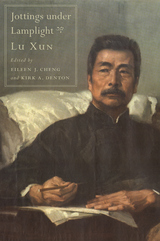
Lu Xun (1881–1936) is widely considered the greatest writer of twentieth-century China. Although primarily known for his two slim volumes of short fiction, he was a prolific and inventive essayist. Jottings under Lamplight showcases Lu Xun’s versatility as a master of prose forms and his brilliance as a cultural critic with translations of sixty-two of his essays, twenty of which are translated here for the first time.
While a medical student in Tokyo, Lu Xun viewed a photographic slide that purportedly inspired his literary calling: it showed the decapitation of a Chinese man by a Japanese soldier, as Chinese bystanders watched apathetically. He felt that what his countrymen needed was a cure not for their physical ailments but for their souls. Autobiographical accounts describing this and other formative life experiences are included in Jottings, along with a wide variety of cultural commentaries, from letters, speeches, and memorials to parodies and treatises.
Lu Xun was remarkably well versed in Chinese tradition and playfully manipulated its ancient forms. But he also turned away from historical convention, experimenting with new literary techniques and excoriating the “slave mentality” of a population paralyzed by Confucian hierarchies. Tinged at times with notes of despair, yet also with pathos, humor, and an unparalleled caustic wit, Lu Xun’s essays chronicle the tumultuous transformations of his own life and times, providing penetrating insights into Chinese culture and society.
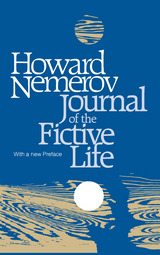
"He often shows bravery and shrewdness; the book is full of fine criticism and psychological insight. As always, his prose has that ease and transparency that make one forget one is reading; one seems simply to hear a voice speaking. Nemerov's improvised self-analysis has weaknesses, but few that he himself doesn't eventually recognize."—New York Times Book Review
"In an age of explicitness, Nemerov's Journal of the Fictive Life is explicitly without vulgarity; in an age of revelation, it reveals only what counts. More then a book about creativity, it is a beautiful creation."—Richard G. Stern
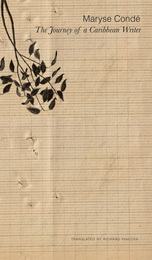
Even while paying homage to her intellectual and literary influences—including Frantz Fanon, Leopold Sedar Senghor, and Aimé Césaire—Condé establishes in these pages the singularity of her vision and the reason for the enormous admiration that her writing has garnered from readers and critics alike.
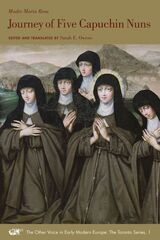
Journey of Five Capuchin Nuns contains all the elements of a riveting adventure story. Through the eyes of the Mother Abbess, María Rosa, the reader is taken along on this journey through wars, pirates, disease, travel on the high seas, and treacherous mountain passes in the Andes. Five nuns set out in the early 1700s from their cloistered convent in Madrid, Spain, to travel halfway around the world to Lima, Peru. The journey lasted three years—an odyssey not all of them would complete. Yet, this unique historical document is so much more than a typical travel narrative. It illuminates the eighteenth-century way of life of religious women on both sides of the Atlantic basin. María Rosa’s lively prose attests to the literary connection among women religious writers of Spain and Latin America. This annotated edition and first-ever English translation of the manuscript will be of interest to scholars, students and anyone who wants to learn more about women’s history.

Renowned poet Richard Tillinghast’s wanderlust and restless spirit are nearly as well known as his verses. This book of essays captures that penchant to wander, yet Journeys into the Mind of the World is not merely a compilation of travel stories—it is a book of places. It explores these chosen locations—Ireland, England, India, the Middle East, Tennessee, Hawaii—in a deeper way than would be typical of travel literature, attempting to enter not just the world, but “the mind of the world”—the roots and history of places, their political and cultural history, spiritual, artistic, architectural, and ethnic dimensions.
Behind each essay is the presence, curiosity, and intelligence of the author himself, who uses his experience of the places he visits as a way of bringing the reader into the equation. Tillinghast illuminates his travels with a brilliant eye, a friendly soul, and eclectic knowledge of a variety of disparate areas—Civil War history, Venetian architecture, Asian cultures, Irish music, and the ways of out-of-the-way people. This attention to history and cultural embeddedness lends unique perspectives to each essay.
At the heart of his journeys are his deep roots in the South, tracing back to his hometown in Tennessee. The book explores not only Tillinghast’s childhood home in Memphis, but even the time before his birth when his mother lived in Paris. Readers will feel a sense of being everywhere at once, in a strange simultaneity, a time and place beyond any map or guidebook.
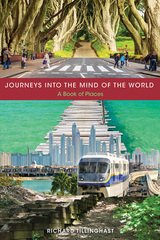
Renowned poet Richard Tillinghast’s wanderlust and restless spirit are nearly as well known as his verses. This book of essays captures that penchant to wander, yet Journeys into the Mind of the World is not merely a compilation of travel stories—it is a book of places. It explores these chosen locations—Ireland, England, India, the Middle East, Tennessee, Hawaii—in a deeper way than would be typical of travel literature, attempting to enter not just the world, but “the mind of the world”—the roots and history of places, their political and cultural history, spiritual, artistic, architectural, and ethnic dimensions.
Behind each essay is the presence, curiosity, and intelligence of the author himself, who uses his experience of the places he visits as a way of bringing the reader into the equation. Tillinghast illuminates his travels with a brilliant eye, a friendly soul, and eclectic knowledge of a variety of disparate areas—Civil War history, Venetian architecture, Asian cultures, Irish music, and the ways of out-of-the-way people. This attention to history and cultural embeddedness lends unique perspectives to each essay.
At the heart of his journeys are his deep roots in the South, tracing back to his hometown in Tennessee. The book explores not only Tillinghast’s childhood home in Memphis, but even the time before his birth when his mother lived in Paris. Readers will feel a sense of being everywhere at once, in a strange simultaneity, a time and place beyond any map or
guidebook.
RICHARD TILLINGHAST is the author of three recent books of poetry: Sewanee Poems (Evergreen, 2009; second edition, 2012), Selected Poems (Dedalus, Dublin, 2009), and Wayfaring Stranger (Word Palace, 2012). Among his nonfiction books are Finding Ireland (University of Notre Dame, 2008) and An Armchair Traveller’s History of Istanbul (Haus Publishing, London, 2012).
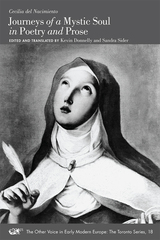
—Stacey Schlau
Professor, Department of Languages and Culture and the Women’s Studies Program
West Chester University, Pennsylvania

Each of the twelve essays considers a different poet—Edward Thomas, Henry W. Longfellow, George Scarbrough, Elizabeth Bishop, Geoffrey Hill, Primus St. John, Robert Hayden, Elizabeth Coatsworth, Gwendolyn Brooks, Robert Frost, E.A. Robinson, and Belle Randall—and, alongside them, different concerns of parenting and living. Organized in chronological order, they track the growth of Nathaniel Perry’s own children who pop up from time to time in a believable way. Essays consider the idea of devotion and belief, the idea of imperfection, the small details we can focus on as parents, and the conceptions of the world we pass along to our children. Together these essays not only represent the author's personal canon of poets who have been important to him in his life and work, but also present a diverse slice of American poetry, in voice, form, identity, origin, and time period.
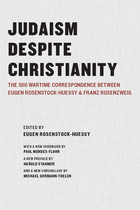
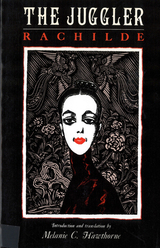

The emperor who renounced Christianity.
Julian (Flavius Claudius Iulianus) “the Apostate,” Roman Emperor, lived AD 331 or 332 to 363. Born and educated in Constantinople as a Christian, after a precarious childhood he devoted himself to literature and philosophy and became a pagan, studying in various Greek cities. In 355 his cousin Emperor Constantius called him from Athens to the court at Milan, entitled him “Caesar,” and made him governor of Gaul. Julian restored Gaul to prosperity and good government after the ravages of the Alamanni (he overthrew them at the battle of Strassburg in 357) and other Germans. Between 357 and 361 Julian’s own soldiers, refusing to serve in the East at Constantius’ orders, nearly involved Julian in war with Constantius—who, however, died in 361, making Julian sole Emperor of the Roman world. He began many reforms and proclaimed universal toleration in religion but pressed for the restoration of the older pagan worships. In 362–363 he prepared at Constantinople and then at Antioch for his expedition against Persia ruled by Shapur II. He died of a wound received in desperate battle.
Julian’s surviving works (lost are his Commentaries on his western campaigns), all in Greek, are given in the Loeb Classical Library in three volumes. The eight Orations (1–5 in Volume I, 6–8 in Volume II) include two in praise of Constantius, one praising Constantius’ wife Eusebia, and two theosophical hymns (in prose) or declamations, of interest for studies in neo-Platonism, Mithraism, and the cult of the Magna Mater in the Roman world. Misopogon (“Beard-hater”), in Volume II, assails the morals of people in Antioch; the Letters (more than eighty), in Volume III, include edicts or rescripts, mostly about Christians, encyclical or pastoral letters to priests, and private letters. Lastly in Volume III are the fragments of the work Against the Galilaeans (the Christians), written mainly to show that evidence for the idea of Christianity is lacking in the Old Testament.
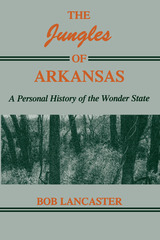

Finalist for the Publishing Triangle's Judy Grahn Award for Lesbian Nonfiction
You have a history, and a body. You are a history, and a body. Your body has (is) a history, too. As a girl, Julie Marie Wade was uninterested in makeup, boy-watching, and other trappings of conventional girlhood, much to her mother’s disappointment. Grace Kelly and Marilyn Monroe—movie stars immortalized as feminine ideals, even as they both died tragically and young—were lodestars that threw Wade’s own definition of beauty into relief as she stumbled into adulthood.
Now, in Just an Ordinary Woman Breathing, Wade traces the intimate story of coming of age in one particular body (as a lesbian, an only child, a Protestant attending Catholic school). She uses the language and tenets of music, math, religion, fairy tales, poetry, and art to reckon with the many facets of embodiment, sexuality, and love in our contemporary world. The diet industry, popular culture, and her own family all provide rich material for what is ultimately a lyrical and unflinching investigation into the questions that prickle deep within the human heart.
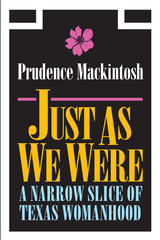
When a Texas debutante bows her forehead to the floor in the famous "Texas dip," society columnists all across the country speculate interminably over what it is that sets Texas women apart. But really, how could they know? Even women born and bred in Texas can't always answer that question.
Prudence Mackintosh comes very close to an answer, though, in this endlessly entertaining book. Writing with both a wry sense of humor and an insider's compassion, she offers us a fascinating look into the world of privileged, educated, well-married, well-connected, and mostly wealthy white Texas women.
What really sets these women apart, Ms. Mackintosh tells us, is the comfortable yet demanding path they follow from their idyllic girlhoods to prominent positions in society. In thirteen essays, some of which originally appeared in Texas Monthly magazine, she charts the way stations that mark this path: summer camps in the Texas Hill Country, exclusive private schools like Dallas' Hockaday, sorority membership, and acceptance into the Junior League.
Prudence Mackintosh has been both an outsider and an insider in this privileged world, and her observations are shot through with wit and real insight. Just As We Were may not be the final word on elite Texas women, but no other book has described their world with greater irony or accuracy.
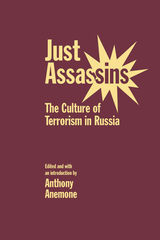
Just Assassins is an engrossing collection of fourteen original essays that illuminate terrorism as it has occurred in Russian culture past and present. The broad range of writers and scholars have contributed work that examines Russian literature, film, and theater; historical narrative; and even amateur memoir, songs, and poetry posted on the Internet. Along with editor Anthony Anemone’s introduction, these essays chart the evolution of modern political terrorism in Russia, from the Decembrist uprising to the horrific school siege in Beslan in 2004.
As terrorism and the fear of terrorism continues to animate, shape, and deform public policy and international relations across the globe, Just Assassins brings into focus how Russia’s cultural engagement with its legacy of terrorism offers instructive lessons and insights for anyone concerned about political terror.
READERS
Browse our collection.
PUBLISHERS
See BiblioVault's publisher services.
STUDENT SERVICES
Files for college accessibility offices.
UChicago Accessibility Resources
home | accessibility | search | about | contact us
BiblioVault ® 2001 - 2024
The University of Chicago Press









